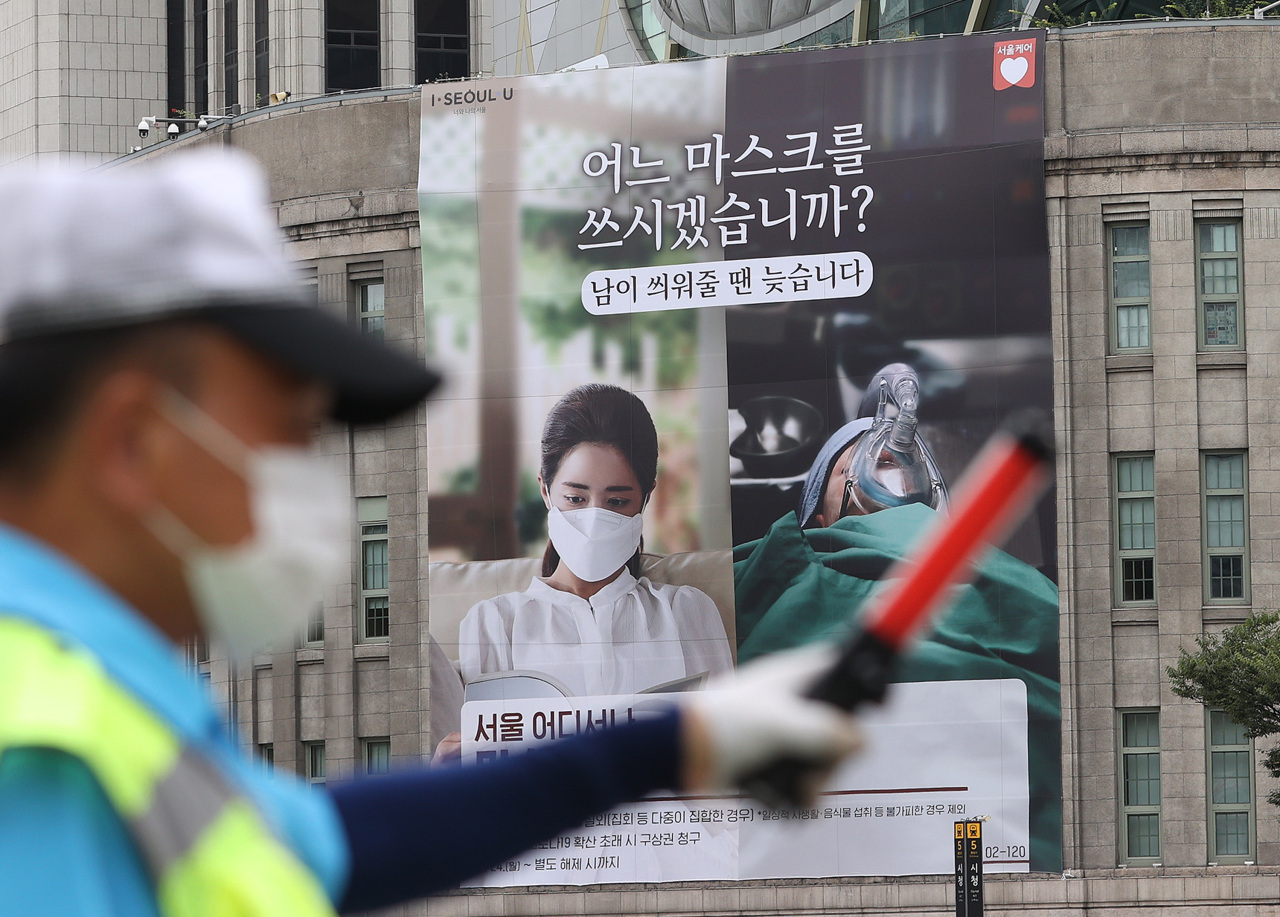South Korea is facing a scarcity of medical professionals to treat COVID-19 patients in severe condition due to ongoing walkout of trainee doctors, according to a health authority on Tuesday.
The number of patients in critical or serious condition has been growing at a fast clip over the past two weeks, from nine people on Aug. 18 to 104 people as of midnight Monday, in the wake of the second wave of infections that has hit the country’s capital and surrounding area.
Concerns over a possible shortage of hospital beds escalated as elderly people aged over 60, who are more vulnerable to the disease, accounted for over 4 in 5 of the 104 patients with severe cases of COVID-19.
The number of hospital beds available for new serious COVID-19 patients across the country stands at 43, including nine in Greater Seoul. As of Sunday, hospital beds for acute patients were fully occupied in Gwangju, Daejeon, Gangwon Province and the South and North Jeolla Provinces.
“The number of patients in critical or serious condition has more than doubled from that of last week. We have nine hospital beds immediately available for admission and have difficulty in securing medical professionals, as trainee doctors are refusing to treat (patients),” Yoon Tae-ho, a senior Health Ministry official, said during a press briefing.
Thousands of trainee doctors working at general hospitals began the strike on Aug. 21 to protest the government’s medical reform scheme aimed at expanding admission quotas at medical schools. The government has put the plan on hold, but the doctors are continuing their indefinite walkout, demanding it be dropped completely.
Health authorities earlier expected that the country will see around 130 serious patients through early September.
The Central Disaster Management Headquarters plans to add 40 more hospital beds by Sept. 14 and move patients who are in mild condition to other wards to secure more space.
South Korea’s COVID-19 tally surpassed 20,000 on Tuesday, over seven months after the first case was reported.
The new daily case number reached 235, raising the total caseload to 20,182 as of midnight Monday, according to the Korea Centers for Disease Control and Prevention. Of the new cases, just 13 were imported from overseas while the rest were locally transmitted.
With no additional deaths reported, the country’s death toll remained at 324.
Of the new cases, over 74 percent, or 175, were detected in the Greater Seoul area, including 93 in Seoul, 60 in Gyeonggi Province and 22 in Incheon.
The country has seen a slight downward trend in new daily cases after reporting a sharp surge on Aug. 27 with 441 cases, but the figures are still far higher than early August when it reported fewer than 50 daily cases.
Seoul has seen a slow decrease in new daily cases, reporting 94 infections as of midnight Monday based on its own data, after hitting 154 cases on Aug. 26.
New sources for group infections have continued to emerge in the city, including in a nursing facility in Seongbuk-gu, a security company in Gangseo-gu and a study cafe in Dongjak-gu.
The utilization rate of hospital wards for treatment of COVID-19 in Greater Seoul -- which includes Gyeonggi Province and Incheon -- stands at 71.1 percent. The city government will add one more residential-treatment facility with capacity of 250 beds and designate Seoul Red Cross Hospital as a health care provider fully responsible for the treatment of the respiratory disease, adding 139 more beds.
Meanwhile, the city government plans to exercise the right to indemnity against Seoul-based Sarang Jeil Church, led by far-right pastor Jun Kwang-hoon, which has become the second-largest virus cluster with 1,056 infections so far. The pastor, along with hundreds of church members, attended the Aug. 15 anti-government rally in central Seoul, a few days after the virus breakout was detected at the church. Some 419 people who attended the rally were diagnosed with COVID-19, excluding those with links to the church.
“We are considering the scope of responsibility that the Sarang Jeil Church should take and the amount of compensation it should pay for violating virus prevention measures and obstructing epidemiologic investigations,” said Park Yoo-mi, an official handling disease control at the city government office.
Meanwhile, as the government placed a ban on restaurants, pubs and bars serving dine-in customers after 9 p.m., people are flocking elsewhere to eat and drink, like convenience stores.
The Seoul Metropolitan Government reminded people that convenience stores are subject to the same rules and announced that on-sight inspections on them would be carried out to check for possible violations.
Starting from Thursday, charter buses for short trips, rallies and one-time events should collect passenger information to help health authorities’ efforts for contact tracing in the event of a virus transmission, the city government said.
“This measure aims to prevent further spread of COVID-19 after a problem found in tracing passengers swiftly and accurately in many charter buses that were uses for rallies in Gwanghwamun and for churches before and after Aug. 15,” Park said.
Buses registered in Seoul or those that operate within the city are obligated to follow the administrative order. Charter buses that run on a regular schedule, like school and commuter buses, are not included.
By Park Han-na (
hnpark@heraldcorp.com)








![[Today’s K-pop] Blackpink’s Jennie, Lisa invited to Coachella as solo acts](http://res.heraldm.com/phpwas/restmb_idxmake.php?idx=644&simg=/content/image/2024/11/21/20241121050099_0.jpg)